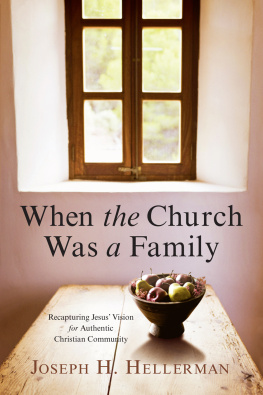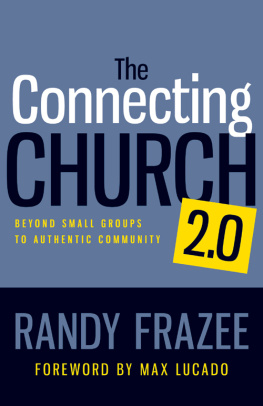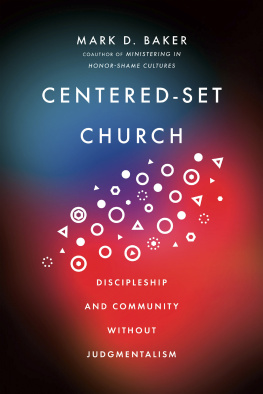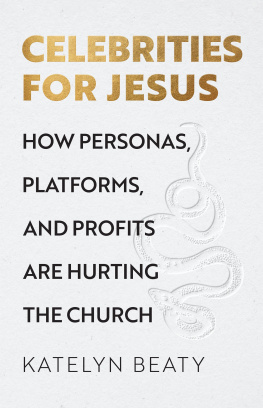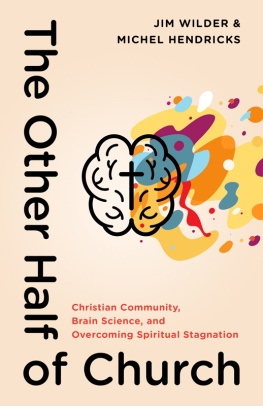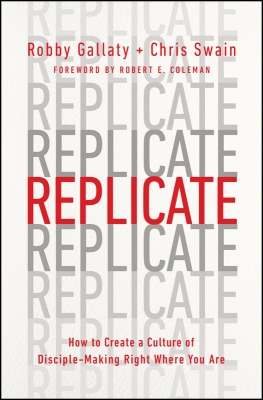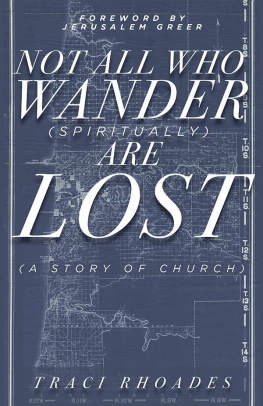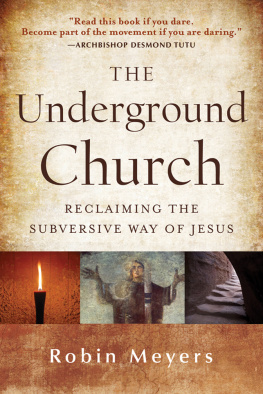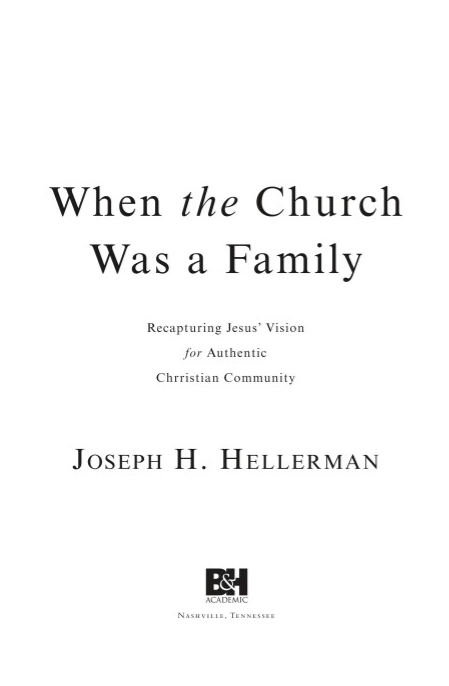Copyright 2009
by Joseph H. Hellerman
All rights reserved.
ISBN: 978-0-8054-4779-8
Published by B&H Publishing Group
Nashville, Tennessee
Dewey Decimal Classification: 262
Subject Heading: CHURCH FELLOWSHIP\FELLOWSHIPBIBLICAL TEACHING\
FELLOWSHIPRELIGIOUS ASPECTSCHRISTIANITY
Unless otherwise noted, Scripture quotes are taken from the Holman Christian Standard Bible Copyright 1999, 2000, 2002, 2003 by Holman Bible Publishers. Used by permission.
Scripture quotations marked NIV are from the Holy Bible, New International Version, copyright 1973, 1978, 1984 by International Bible Society. Used by permission of Zondervan Bible Publishers.
Scripture quotations marked NRSV are from the New Revised Standard Version of the Bible, copyright 1989 by the Division of Christian Education of the National Council of Churches of Christ in the United States of America. Used by permission. All rights reserved.
Printed in the United States of America
INTRODUCTION
Spiritual formation occurs primarily in the context of community. People who remain connected with their brothers and sisters in the local church almost invariably grow in self-understanding, and they mature in their ability to relate in healthy ways to God and to their fellow human beings. This is especially the case for those courageous Christians who stick it out through the often messy process of interpersonal discord and conflict resolution. Long-term interpersonal relationships are the crucible of genuine progress in the Christian life. People who stay also grow.
People who leave do not grow. We all know people who are consumed with spiritual wanderlust. But we never get to know them very well because they cannot seem to stay put. They move along from church to church, ever searching for a congregation that will better satisfy their felt needs. Like trees repeatedly transplanted from soil to soil, these spiritual nomads fail to put down roots and seldom experience lasting and fruitful growth in their Christian lives.
Then there are those who leave to avoid working through uncomfortable or painful relations with others in the church family. Running away does provide immediate relief from the awkwardness of a hurtful relationship. It is the easy way out in the short term, and there are legitimate reasons to leave a local church. But people who leave to escape the hard work of conflict resolution are often destined to repeat the cycle of relational dysfunction with another person in another church somewhere else in town.
It is a simple but profound biblical reality that we both grow and thrive together or we do not grow much at all. None of this is terribly novel. We all know it to be the case. So why do we so often sabotage our most intimate relationships, seek help from others only after the damage is irreversible, and continue to try to find our way through life as isolated individuals, convinced somehow that God will remain with us to lead us and bless us wherever we go? Why do we continue foolishly to operate as if our own immediate happiness is of greater value than the redemptive relationships God has placed us in? Why are we seemingly unable to stay in relationships, stay in a community, and grow in the interpersonal contexts that God has provided for our temporal and eternal well-being?
I count myself blessed to serve on the pastoral team of a vibrant Christian church. We consistently emphasize the inviolable maxim that spiritual formation occurs primarily in the context of community, and we have in place an extensive support and accountability network designed to help our people grow in their abilities to relate to others in a healthy way both at home and in the church.
Our fellowship is average in size: some four hundred persons of all ages attend on a given Sunday. But not a month goes by in which the pastor-elders are not summoned to intervene in some kind of interpersonal crisis among the members of our church family.
Sadly, much of our intervention has little lasting effect upon the health of the relationships involved. In spite of the counsel and support provided by our leadership team and others in the congregation, people in crisis frequently insist on going it alonefollowing their individualistic, often self-destructive pathways. Roberta's pilgrimage is but one example of such behavior.
Roberta's Story
Roberta (not her real name) is a bright woman in her forties with a highly charged emotional attachment to Jesus. Roberta loves to sing in church, and her passion for worship infuses those around her with a desire to know God more deeply. Unfortunately, Roberta's family background has set her on an apparently irreversible course to relational confusion and heartache. After a failed marriage, Roberta lived with a sister for more than a decade, spending hours each week involved in various charitable causes. The sister's death brought to the surface a host of family and financial crises.
Roberta's grief process was highly intensified due to years of dysfunctional family relationships. She was dangerously despondent. It was clear to us that Roberta needed outside help in order to gain a proper perspective on herself and the world around her. Roberta's current money problems were only the latest in a history of such fiscal fiascoes, suddenly intensified by a squabble with her surviving siblings over their sister's estate.
Roberta is loved and highly appreciated by our church family. Our leaders sincerely desired to do something tangible to help Roberta get on her feet again, both emotionally and economically. We offered to meet the most pressing financial needs immediately. But we knew that our assistance would benefit Roberta only if accompanied by several nonnegotiable conditions.
We informed Roberta that the money would be hers if she met three conditions. (1) She would see our staff therapist (initially at the church's expense) on a weekly basis in order to find short-term support and guidance in dealing with the loss of her sister. (2) She would meet with a financial adviser who is a member of our congregation (again, pro bono) to come up with a game plan to dig herself out of debt. (3) She would agree to attend church regularly and partner with others in the church family in some area of ministry.
What we asked of Roberta was really quite straightforward: relational accountability. We challenged Roberta to quit trying to find her way through life as an isolated individual and, instead, to take advantage of the guidance, community, and accountability offered by her brothers and sisters in the family of God. Only in this way would Roberta begin to grow up to become the healthy person God had designed her to be.
Roberta declined our offer and rejected our advice. Like many people in our churches, she chose to chart her own course and to bear her pain alone rather than to integrate herself into the body of Christ through the vehicle of strong relational accountability. We no longer see Roberta at Oceanside Christian Fellowship anymore.
American Individualism and a Church in Crisis
A story like Roberta's impacts more than just the individual involved; it takes its toll on a whole church family. On more than one occasion I spent a great deal of time with Roberta on the phone as the above crisis unfolded. We also dedicated an hour or so of our elder board's precious meeting time in our efforts to carefully craft the three conditions (see above) for the financial assistance that she requested.

